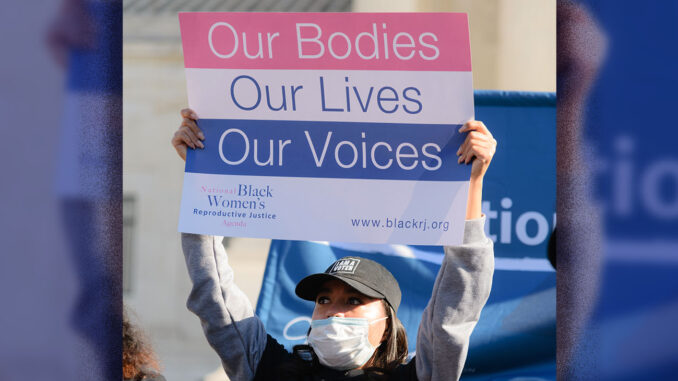
It is no secret that our institutions and health care systems have long failed Black people. We see this in the sky-high rates of Black maternal death, infant mortality, and poor health outcomes across the board. And now, we await one of the most consequential Supreme Court rulings that could push one of our health care options entirely out of reach for Black communities across the country. Access to abortion is deeply connected to the health and economic security for individuals and families. Now is the time for bold action so that the Supreme Court does not deny another of our rights.
Since 1973, Roe v. Wade has been the law of the land, and while abortion remains legal in all 50 states, it has never been widely accessible for Black communities, especially those of us working to make ends meet. In 2021 alone, 108 abortion restrictions were enacted, with the impact falling hardest on Black and Brown people.
For decades anti-abortion lobbyists and politicians have actively worked against us by denying us the agency to determine and control our futures. The ugly truth is that abortion bans are rooted in white supremacy and anti-Black racism, and are, by design, crafted to harm Black people. Bans are not about protecting our mothers, children, and communities, but further controlling, marginalizing, and disempowering us.
Throughout much of its history, the mainstream feminist movement ignored the needs of Black communities. In 1994, Black activists responded to this by creating a visionary framework –– reproductive justice –– which is defined as “the human right to control our sexuality, our gender, our work and our reproduction – the right to have children, not have children, and parent the children we have in safe and healthy communities.”
While activists of color have historically practiced reproductive justice through our grassroots organizing, campaigns, and broader social justice work, naming it has helped further focus on the needs of our communities as mainstream leaders have failed to recognize the unique challenges that Black women in particular face when trying to obtain abortion care. Whether it’s traveling long distances because abortion is not accessible in our communities, the inability to pay for abortion care, or facing racism from health care providers who are not invested in supporting our health and well-being, the consequences are steep. Abortion justice is only one part of our liberation, and we must view it within the wider context of racial, economic, and environmental justice.
The same challenges that prevent people from accessing other vital services also arise when people need an abortion. Abortion funds across the country have been a lifeline for countless communities as they help eliminate the geographic, financial, and other barriers to accessing care, but this should not be our reality when abortion is legal in all 50 states. As other states move to pass copycat bills modeled after Texas’ 6-week abortion ban, we need to urgently change course.
Abortion is rooted in freedom. When abortion is available and affordable, we are more able to make our own decisions about whether and when to start or expand our families. This gives us the opportunity to make important decisions about our health, to care for our families, to pursue our dreams, and to live in thriving communities. When abortion is accessible, we see its positive impact for generations, but when it is pushed out of reach, it causes irreparable harm to the emotional, financial, and physical health of those who are forced to carry a pregnancy against their will.
Even If the Supreme Court upholds Roe later this year, it will still not be enough. From the grassroots activism on the ground to the politicians making decisions about what we can and cannot do with our bodies, this is why we need to support efforts to ensure all people have real access to abortion. Abortion care that is covered by insurance, that is nearby, and without unnecessary waits, or asking neighbors to spy on us, or any other efforts to interfere with our decisions. In short, access to abortion care, just as other health care, should not depend on where we live or who sits in power in our state capitals.
Black women have always been visionary leaders at the helm of all forms of social justice in the face of seemingly insurmountable odds. We have fought for a better, brighter future because we know it is our birthright. This is why we continue to demand that our elected officials do more for us –– to make abortion accessible and affordable to all who need it. Abortion access is about much more than our legal rights; it is about our humanity, dignity, and freedom –– and we deserve to be free.
Marcela Howell is president and CEO of In Our Own Voice: National Black Women’s Reproductive Justice Agenda. Follow her work on social media at @BlackWomensRJ.


Be the first to comment